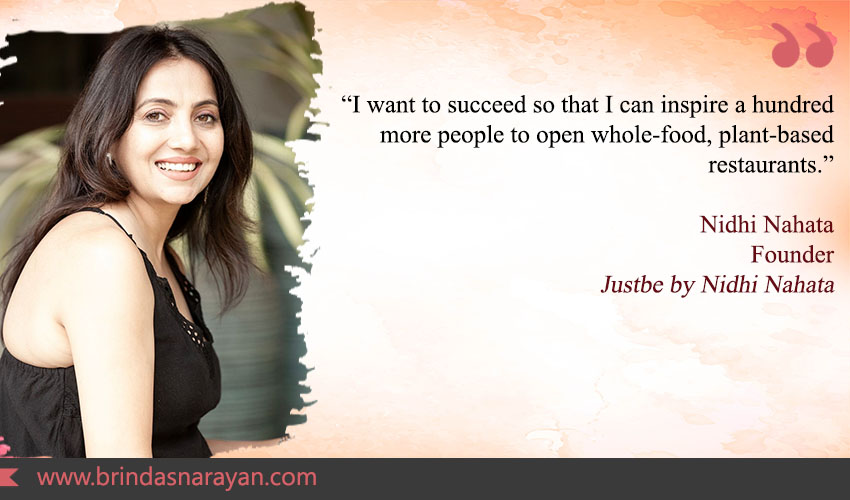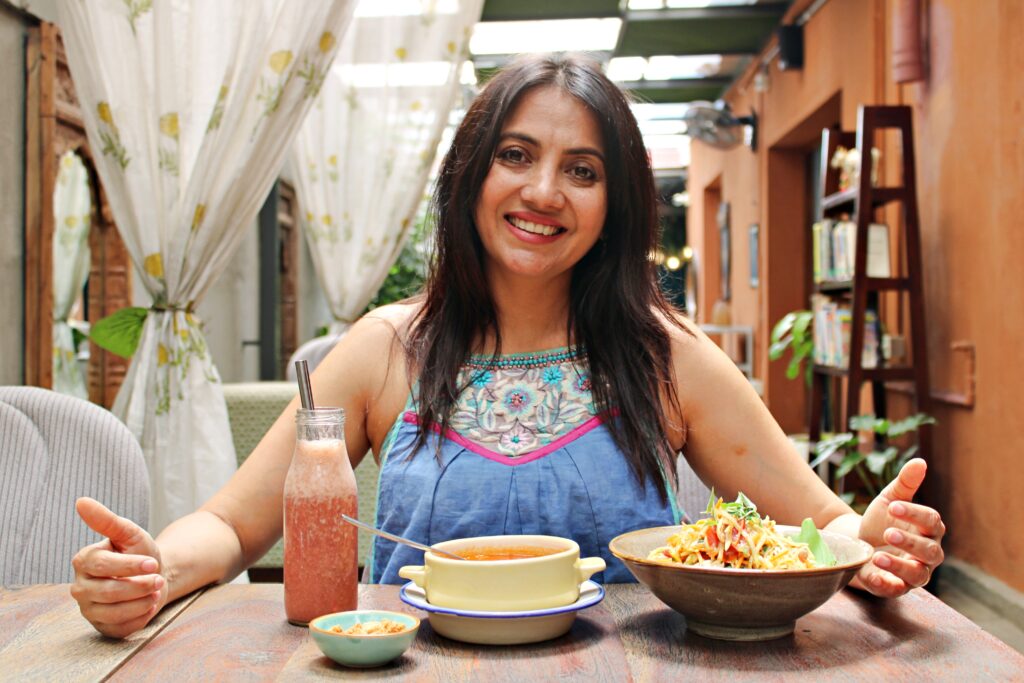
Spreading Vegan Vibes: Nidhi Nahata’s Recipe for Success
Marwari Warmth, A Young Apprentice
Nidhi Nahata grew up in a Mumbai Marwari household, infused with the sounds and smells of rich, homemade foods: “Khaana with a lot of ghee, even the paneer, my Mom used to make at home.” Sweets like sandesh or rasagullas, comfort foods like dal chawal were churned out to be as flavorful as possible. Moreover, as the oldest among four siblings, caretaking came naturally to Nidhi. She recalls a time, when she was merely 8 or 9 years old when her Mom had stepped out. She briskly rolled out rotis and fed them to her sisters, with pickles and sides.
The care and feeding didn’t stop with the family. Her father didn’t stress much about his daughters’ academic records. But he was insistent that they treat guests with the veneration accorded to gods. Starting with the precise manner in which foods and snacks were served to their being ferried around to touristy spots. Nidhi hadn’t realized this then, but from an early age, she imbibed the niceties of hospitality.
From Kitchen to Classroom
Married off very young, at 19, she carried timeworn but trusted rituals into her new joint family. Determined like many young brides to feed her family with scrumptious ghar ka bana hua khaana, she spent hours in the kitchen, recreating recipes that had been handed down over generations. In the meanwhile, she had also turned into the mother of two boys. “Had my first at 20, my second at 23.”
At 35, she started sensing that she needed to widen her own horizons. Her early marriage had curtailed her formal education, but she was inquisitive about the world. And about herself. Moreover, her sons were teens and pre-teens, so she groped for a vocabulary to describe their feelings and hers. In 2007, she signed up for a counseling course. She was less interested in theory than in practical advice.
After certifying herself with diploma courses that included life skills training, she signed up as a volunteer facilitator at Mount Carmel College and at Christ University, where she lectured students on sexuality and transactional analysis. Though Christ was keen on snapping her up for a full-time role, she decided to take a break. Her sons were in their critical 10th and 12th Standards at that point.
Healing Through Nutrition
During a regular medical checkup, she was shocked that her total cholesterol had spiraled to an alarming 300. She instinctively shied away from medicating her condition. As someone who had been a lifelong vegetarian, she started pondering about how she could alter her diet. And perhaps integrate more exercise into her routines. Besides her high cholesterol, she also suffered from skin allergies (rosacea) and migraines from the age of 18.
Stumbling on an organization called Sharan founded by Dr. Nandita Shah, she called the founder. Dr. Shah was confident that folks could reverse many ailments with dietary changes sans medication. Her organization, based in Auroville, offered workshops for lay persons and aspiring facilitators. Eventually signing up for a 21-day course at Sharan, Nidhi relished her longest solitary break from the rinse-repeat of domestic chores. “I think it was one of the most beautiful gifts I gave myself,” she says.
During that period, she witnessed changes in her own body and of fellow-attendees. Like someone’s BP dropping, or a diabetic slurping mangoes without sugar spikes. “I saw miracles happen with food. Why don’t we know that food is our medicine and medicine is our food?” There were, naturally, cases where the ailment did not completely vanish. But folks reported reductions in distress. For instance, an arthritic woman from London with stiff hands and fingers said her pain had diminished.

The group also watched Earthlings (2005), an American documentary that wades into industrialized farms, animal labs and pet stores to capture the hidden cruelties of our consumption practices. Nahata made a life altering decision by the end of the Sharan session: to switch to a whole foods, plant-based diet. Extending beyond a typical vegan regime, she also intended to cut out processed foods and refined oils.
Transforming Taste, One Recipe At a Time
Returning to Bangalore, she was eager to apply her learnings in the family kitchen. At home, they had always been meatless. Sharan had taught her to also eliminate dairy and other animal products like honey. As a first step, she discarded all their packaged foods and refined flours, and taped up her microwave.
Cooking without oil, sugar, maida or milk, she practiced with substitutes: like almond, sesame or walnut milks. Soon, the family started hurling challenges: “Make a pizza.” “Or Thai noodles.” She started converting all recipes to whole-food based ones, ensuring that the end-result was always appetizing: “I could transform any recipe.” There was resistance. Her older son said he wasn’t going to renounce chocolates. Her husband, despite being Marwari, loved curd rice.
As a psychologically astute counsellor Nahata stopped talking about her experiments. Instead, she presented alternatives on the dining table – tasty foods with appealing looks. “Most people don’t care about ingredients or how you made something,” she observes. When offered yummy options, they did what many would: quietly tuck in.
For a few months, her family also continued eating stuff they were used to. Gradually, however, Nidhi’s kitchen experiments were paying off. One day, she watched Earthlings with her son. He too decided to forsake dairy products. In a few months, he found he was no longer using inhalers for his asthma. Her husband, Tarun, who had always struggled with acidity, found his digestive system working better.
From Vegan Family to Vegan Restaurant
It reached a point when her family was hooked on being vegan. When her son started looking out for restaurant options to visit with friends, he found there were none. Nidhi joined the Google hunt and was surprised that Bangalore, in 2017, didn’t have a single whole-foods, plant-based eatery. Forget Bangalore, she couldn’t spot any in the country! Next morning, she woke up with a brainwave. To start a restaurant, that would serve the kind of food that she believed in.
Her husband was concerned that they didn’t have any experience. When Nidhi was firm, he encouraged her to give it a shot. When she pitched the idea to industry experts and consultants, they politely rebuffed the idea of an eatery without ghee, milk, sugar, butter, maida or oil. Some called her “crazy.” They pointed to a lack of demand in the market. “I will create demand,” said Nahata, who hadn’t run a business till then. Perhaps, for that reason, she didn’t seek external validation. She was resolute about this being a “good thing” to launch.
She and Tarun had jointly decided that she would give the idea a few months. But she would be willing to shut shop if it did not take off. Inwardly, Nidhi was convinced that wouldn’t happen. “Why wouldn’t a conscious business work?” she asks with wide-eyed earnestness. “Which is going to help folks eat healthier while saving animals? And is good for the planet?”
Turning Doubts to Dishes
She observes that, at first, even the chef was hesitant. Make cheeses with nuts and seeds? Pizzas with whole wheat? Would anyone eat that? But Nidhi’s zeal was infectious. Over time, the chef’s objections melted.
But she also had to contend with other challenges. Nahata had fixed a date for Justbe by Nidhi Nahata’s pre-launch on June 3rd, 2017. On May 30th, four team members vamoosed. Others panicked. They suggested they postpone the launch. Nidhi was obstinate about not changing the date. After all, they had already invited a cohort of well-wishers. “My children, my sister from Mumbai, me, everyone in my family took orders. Manual orders that we wrote down, handed over to the kitchen, while generating manual bills.” They pulled it off. Nidhi transmitted what she felt was a crucial message to the team: “There are no nos. Anything is possible.”
In the initial months, she was everywhere. In the service area, where she would quickly spot unhappy or disappointed customers. In the kitchen, in the cleaning area. By observing and doing, she learned how to iron out glitches. She was also very hands on, ensuring that everything was cooked and plated to perfection.

The intricate processes of running a restaurant kitchen, something that Nahata hadn’t done earlier, were gleaned on the job. She realized quickly that when ten orders rolled in together, the kitchen had to respond differently. She also noticed this about herself: at times of high stress, she absorbed information rapidly. Perhaps, she laughs, it comes with a strong survival instinct. Her personal learning curve has been steep at Justbe, as she manages the ongoing challenges of a food business.
Cooking Up a Community
At first, Nahata wasn’t savvy on social media. Her social media hire wasn’t deft either. Instead, Nidhi turned to word-of-mouth. She conducted cooking classes at the restaurant, to introduce people to the concept powering her venture. She also held educational talks. And willingly conducted cooking demos and talks at events – like at kitty parties, entertainment venues: “Like how dhal tadka can be done without a drop of oil.” Keen to spread the message, she did a lot of this for free, at that stage. She also suggested dietary changes that her listeners could incorporate into their own lives.
Gradually a community started building. The restaurant was getting fuller on weekends. While she had hired and trained a chef for the restaurant, she was keen on upskilling herself. She completed an online Cornell University certification in plant-based nutrition.
Cracking New Recipes
Among the dishes forged at Justbe, Nidhi recalls the effort that went into creating some marquee ones. For instance, baked nachos, where they didn’t add oil in the dough. “It took us almost a month to crack that recipe,” she says. Today they offer baked beetroot and spinach nachos, a popular appetizer. Like Elizabeth Zott in Lessons in Chemistry, Nahata says, “The kitchen was like a lab.” Many dishes were being created for the first time, since the challenge was to adapt to fewer ingredients.
Like with any new business, Nidhi has had to deal with mixed reactions. While some diners said they were willing to go vegan, if their everyday food could taste like this, others said the rotis were too dry, or that whole wheat pizza didn’t make the cut. Over time, as more people started seeking healthful menus, their five-star ratings had overtaken the grumblers.
Nahata sources her ingredients from organic vendors and small-time suppliers, once she’s convinced about reliability and consistency. As someone who has spent decades in her own home kitchen, she has particular fondness for homegrown ventures. For instance, she also buys from small-time producers of microgreens. “We always like to support smaller businesses,” she says.
As the business has grown, her younger son has joined the venture in 2021. Armed with a finance degree from Los Angeles, he keeps an eye on the numbers, an area that Nahata admits is not her strong point. He’s also been able to ramp up their presence on social media.
In terms of tinkering with the menu to introduce new dishes, Nidhi says they seek a balance between keeping old favorites – that many return to eat – and injecting novelty. One of the ways in which they test out new dishes is with weekend specials. Which is also a great way to gather live customer feedback.
Inspiring Palates, Changing Lives
One of her objectives in running Justbe by Nidhi Nahata is to inspire others to kick off vegan restaurants, so that plant-based foods become more widespread. She realizes, by studying her own body and mind, that food therapy is closely tied to other types of therapy. Having studied counseling earlier, she recognized shifts in her own internal state, when she changed her diet. She uses her nutritional expertise to coach clients into engendering similar shifts in themselves.
For newcomers who want to enter the food business, to kickstart a restaurant or a homegrown venture, she suggests that they shouldn’t just do the work, but live their philosophy. “Be it,” she says, alluding to the name of her restaurant. She cautions against riding trends or fads. If you don’t deeply believe in something, she warns that the passion would be hard to sustain. “When you speak, and when your venture is coming from a very deep place, it’s very convincing.” In other words, you need to practice what you’re trying to sell or propagate.

In 2019, a visitor from London happened to be in Bangalore. And was specifically looking for a whole foods, vegan restaurant. And stumbled on Justbe. When he saw the menu and met Nahata, he couldn’t believe his luck. He didn’t think foods that catered to his very specific diet would be available at an attractive eatery in Bangalore. He said, “Am I dreaming or are we in 2026?” Words like that are enough to fuel the founder, who constantly dreams of new plans to pep up her venture, and broaden her reach. Her restaurant has already won several awards including, most recently, the “Best Vegan Restaurant in India” at the Zee Zest Unlimit Awards 2024.
The most gratifying moments for her, personally, have been when customers have come across to say that from now on, they plan to dispense with sugar in their tea and coffee and use jaggery. Or to reduce the oil in their cooking. Because they loved how everything tasted at Justbe. That, for Nahata, is reason enough to keep going.
References




